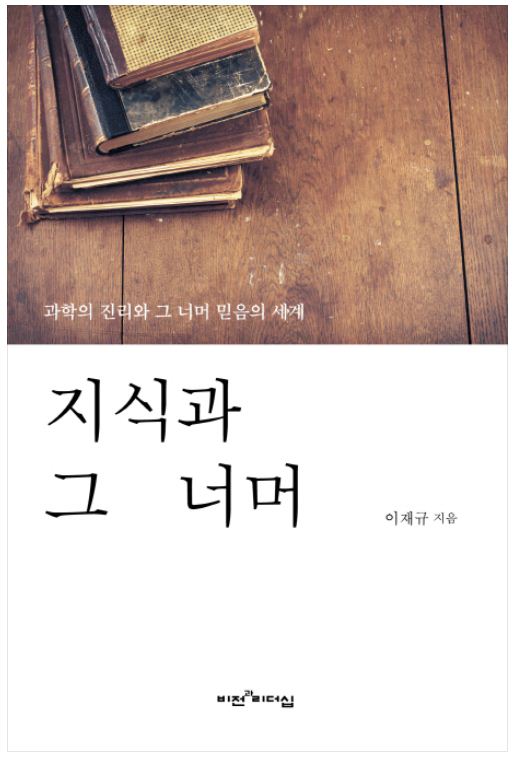people
Professor Jae-Kyu Lee of KAIST’s College of Business has recently published a book called Knowledge and Beyond (available only in Korean). It deals with selected aspects of science and the world around us.
In Knowledge and Beyond, he expounds on his understanding of science, business, life, and religion. In part autobiographical, he describes his thirty-year career and his interaction with his past students who are now leading scientists and scholars in Korea, and offers some advice on how to better treasure life. Professor Lee also recounts his own life: his childhood, growing up and maturing with his mates, love at first sight of and his unconditional love towards his wife.
With respect to science, he talks about the origin of knowledge and ways to find solutions to questions that seem almost impossible to answer and offers a few aphorisms, such as: “studying is more like a marathon, not a boxing match;” “do not predict, but plan your future” and “learn by head in class, learn by heart in life.”
Knowledge and Beyond is a must read for those who have become exhausted by today’s competitive world, reminding readers of their life goals and paths.
Professor Lee said, “I wrote this book for the young to share the true meaning of life over plain knowledge. You can never find out the true meaning of life unless you combine simple and spiritual knowledge, and I hope this book helps in showing a way to achieve it.”
Professor Lee has taught at KAIST since 1985, and is currently the Dean of KAIST's Business College. He was formerly the Dean of KAIST College of Management, Director of KAIST EEWS (energy, environment, water, and sustainability) and the Vice Provost of the Singapore Management University’s School of Information Systems. He was also the President of The Korea Society of Management Information Systems and the President of Korea Intelligent Information System Society.

-
research Simultaneous Analysis of 21 Chemical Reactions... AI to Transform New Drug Development
< Photo 1. (From left) Professor Hyunwoo Kim and students Donghun Kim and Gyeongseon Choi in the Integrated M.S./Ph.D. program of the Department of Chemistry > Thalidomide, a drug once used to alleviate morning sickness in pregnant women, exhibits distinct properties due to its optical isomers* in the body: one isomer has a sedative effect, while the other causes severe side effects like birth defects. As this example illustrates, precise organic synthesis techniques, which selectivel
2025-06-16 -
event KAIST Holds a Ceremony to Declare their Renewed Commitment for Ethical Management
KAIST held a ceremony to declare their renewed "Commitment for Ethical Management" to raise awareness and solidify the commitment its members to faithfully fulfill ethical responsibilities and duties. Last March, the university established the 'Special Committee for Ethical Management,' chaired by the Provost, and under the leadership of this committee, a new 'Code of Ethics' and 'Code of Conduct' were prepared, containing ethical standards that members must adhere to across all areas of educ
2025-06-16 -
research “One Experiment Is All It Takes”: KAIST Team Revolutionizes Drug Interaction Testing, Replacing 60,000 Studies
A groundbreaking new method developed by researchers at KAIST and Chungnam National University could drastically streamline drug interaction testing — replacing dozens of traditional experiments with just one. The research, led by Professor Jae Kyoung Kim of KAIST Department of Mathematical Sciences & IBS Biomedical Mathematics Group and Professor Sang Kyum Kim of Chungnam National University's College of Pharmacy, introduces a novel analysis technique called 50-BOA, published in Natu
2025-06-16 -
research High-Resolution Spectrometer that Fits into Smartphones Developed by KAIST Researchers
- Professor Mooseok Jang's research team at the Department of Bio and Brain Engineering develops an ultra-compact, high-resolution spectrometer using 'double-layer disordered metasurfaces' that generate unique random patterns depending on light's color. - Unlike conventional dispersion-based spectrometers that were difficult to apply to portable devices, this new concept spectrometer technology achieves 1nm-level high resolution in a device smaller than 1cm, comparable in size to a fingernail
2025-06-13 -
research KAIST Predicts Diseases by Early Detection of Aging Signals in Liver Tissue
- KAIST-KRIBB Develops ‘FiNi-seq’ Technology to Capture Characteristics of Fibrotic Microenvironments Accumulated in Liver Tissue and Dynamic Changes of Early Aging Cells - Elucidation of the Spatial Ecosystem of Aged Liver Tissue, where Reprogramming of Senescent Cells and Immune Exhaustion Progresses, at the Single-Cell Genome and Epigenome Levels < (From left) Professor Jong-Eun Park of KAIST Graduate School of Medical Science and Engineering (GSMSE), Dr. Chuna Kim of K
2025-06-12